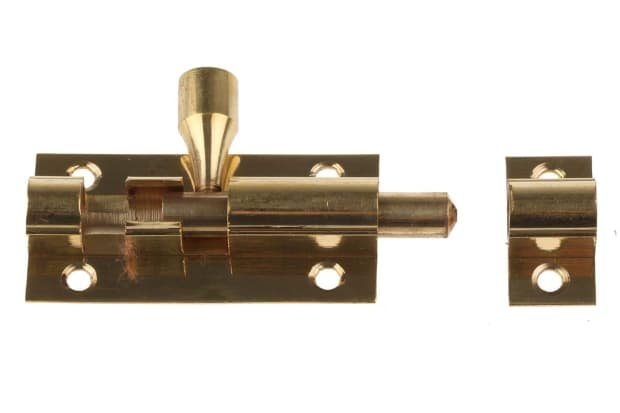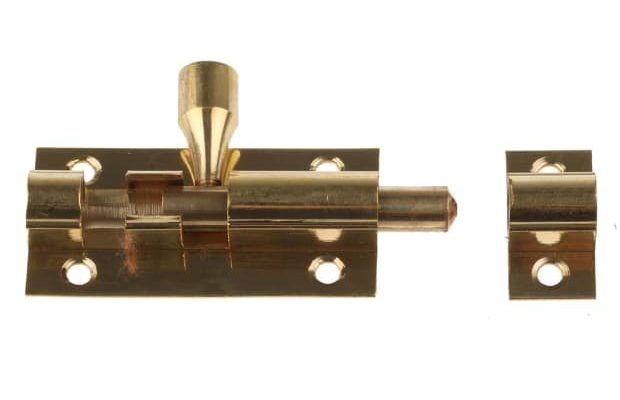
Understanding Door Latch Bolts
Before we dive deep into the brass versus steel debate, let’s clarify what door latch bolts are. They’re the metal pieces that secure your door when it’s closed, preventing it from being easily opened. Picture a strong knight guarding a castle gate—this is what latch bolts do for your home. They come in various shapes and sizes, with different mechanisms, but they ultimately serve the same purpose: to keep unwanted visitors out and ensure your peace of mind.
When selecting a door latch bolt, durability is a key factor. You want something that won’t wear out after a few months or stand up poorly against weather changes. The materials used in these bolts are fundamental to their performance, and that’s where our two main players—brass and steel—come into the picture.
Brass Door Latch Bolts: The Elegant Choice
Brass is an alloy, primarily made of copper and zinc. One of the biggest draws of brass door latch bolts is their corrosion resistance. If you live in a humid area or near salt water, brass might be your best bet. It’s less likely to rust or deteriorate when exposed to moisture. Imagine a rainy day: your brass latch bolt remains unscathed while others might start to corrode.
Another important feature of brass is its aesthetic appeal. It has a warm, rich color that can complement various home styles, from traditional to modern. Plus, brass tends to develop a lovely patina over time, adding character to your home. It’s like a fine wine that gets better with age.
However, brass isn’t without its downsides. While it’s resistant to rust, it’s not as strong as steel. If you live in an area prone to break-ins or have kids who might be a bit rough with doors, you might want to reconsider. Under heavy force, brass can bend or break more easily compared to its steel counterparts.
Steel Door Latch Bolts: The Strong Contender
Now let’s talk about steel. Steel is known for its incredible strength. If you’re looking for a door latch bolt that can withstand force and tampering, steel is the way to go. Think of it as your loyal guard dog—strong, reliable, and ready to protect. Steel bolts often feature additional coatings like zinc to help prevent rust, making them versatile for different environments.
Another great thing about steel is that it’s budget-friendly. You often find steel latch bolts at lower price points without compromising on security. This makes them a favorite among homeowners aiming for both safety and value. If you’re doing a home renovation and need to secure multiple doors, opting for steel can save you some cash.
However, keep in mind that steel can corrode if not treated properly. If you live in a damp area, investing in a high-quality coated steel bolt is important. Otherwise, you might find yourself replacing it sooner than expected. Imagine spending your hard-earned money on something only to have it start rusting after a few months—definitely not ideal.
Comparing Durability: Brass Vs. Steel
When it comes to durability, brass and steel serve different purposes. Here’s a breakdown of how they compare:
| Material | Corrosion Resistance | Strength | Cost | Aesthetic Appeal |
|---|---|---|---|---|
| Brass | Excellent | Moderate | Higher | Warm and Elegant |
| Steel | Good (with coating) | Excellent | Lower | Functional but Less Attractive |
What does this mean for you? If you prioritize security and strength, steel is your best bet. But if you love the look of brass and live in an area with high humidity, then brass may be the way to go. Each material has its niche, so the best choice depends on your specific needs and preferences.
Choosing the Right Material for Your Needs
Now that you know the basics of brass and steel, how do you decide which is right for you? Start by assessing your environment. If you live in a coastal area or somewhere with heavy rain, brass may be your champion. On the flip side, steel could be the knight you need if security is your top concern.
Also, consider the aesthetic of your home. Are you going for a classic look? Brass might fit beautifully. Need something more utilitarian? Steel may be the more practical option. It’s all about balancing your needs with the look you want.
Lastly, think about your budget. While steel tends to be cheaper, high-quality brass can last a long time, which could save you money in the long run. Sometimes, investing in quality pays off.
Installation Tips for Longevity
Once you choose your material, proper installation is key to longevity. Here are some quick tips to ensure your latch bolt stands the test of time:
- Follow Instructions: Each latch bolt comes with specific installation instructions. Make sure to follow them closely.
- Use Quality Tools: The right tools will make installation smoother and help you avoid damaging the bolt.
- Seal Vulnerable Areas: If you have a steel bolt, consider applying a rust-resistant spray to increase longevity.
- Regular Maintenance: Check your bolts periodically for signs of wear or damage, especially in harsh conditions.
Taking these steps can help you maximize the life of your door latch bolts, whether you choose brass or steel.
In the battle of brass versus steel for door latch bolts, there’s no clear winner. Each material has unique strengths and weaknesses that cater to different needs and environments. Your choice ultimately hinges on what matters most—whether that’s aesthetics, strength, or cost.
So, the next time you’re shopping for door latch bolts, take a moment to think about what you really need. Are you looking for elegance and corrosion resistance with brass, or is robust strength and budget-friendliness with steel more your style? No matter your choice, you’ll be one step closer to fortifying your home against unwanted guests.
